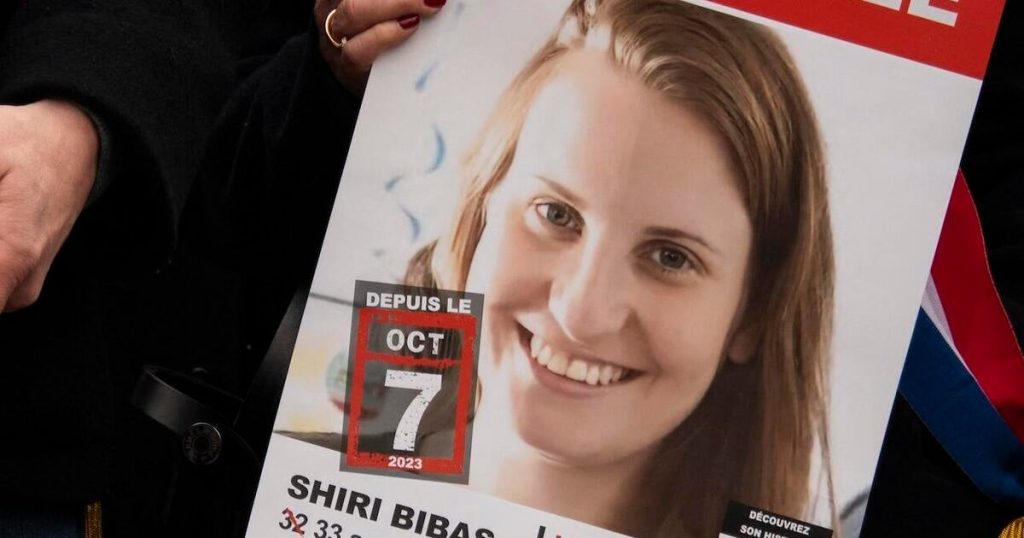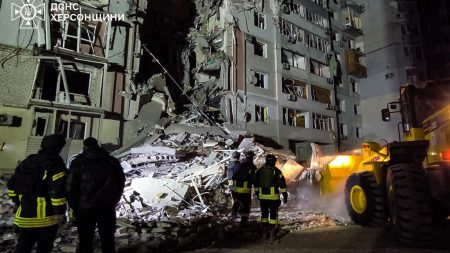The Return of Shiri Bibas: A Family’s Quest for Closure
The remains of Shiri Bibas, an Israeli hostage taken during Hamas’ attack on October 7, 2023, were finally returned to her family, marking a poignant breakthrough in a 16-month ordeal. Shiri, along with her two young children, Ariel (4 years old) and Kfir (9 months old), were among the victims of the brutal assault that sparked a devastating war between Israel and Hamas. The family’s harrowing journey began when they were captured by Hamas militants, leaving their loved ones in a state of agonizing uncertainty.
The return of Shiri’s remains was confirmed by her family on Friday night, a day after a heartbreaking mix-up. Initially, Hamas had handed over four bodies on Thursday as part of a Gaza ceasefire agreement that went into effect on January 19. While the remains of her children were identified correctly, the body purported to be Shiri’s was later discovered to belong to an unidentified Gazan woman. The Israeli Institute of Forensic Medicine conducted thorough examinations to confirm the identity of Shiri’s remains, bringing a measure of certainty to her grieving family.
In a statement released by the advocacy group "Bring Them Home Now," the Bibas family expressed the complexity of their emotions, stating, "For 16 months we sought certainty, and now that it’s here, it brings no comfort, though we hope it marks the beginning of closure." The family also shared that details about memorial services for Shiri and her children would be announced later, as they navigate this difficult time.
A Painful Mix-Up and Its Aftermath
The mistaken return of the wrong body added further strain to an already fragile ceasefire agreement. Hamas, designated a terrorist group by the U.S. and Israel, had agreed to hand over the remains of Israeli hostages as part of the truce. However, the error in identifying Shiri’s body sparked widespread outrage and deepened the emotional toll on her family. Israeli Prime Minister Benjamin Netanyahu condemned the mistake as a "cruel and wicked violation" of the ceasefire, vowing to hold Hamas accountable and make them "pay the full price" for their actions.
The mix-up also highlighted the precarious nature of the ceasefire, which has been fraught with challenges since its implementation. The first phase of the agreement, set to expire next week, required Hamas to release 33 living Israeli hostages within six weeks. While six hostages are expected to be freed on Saturday, the handover of the wrong body has cast a shadow over the progress made so far.
The Broader Conflict and Its Human Toll
The war between Israel and Hamas has exacted a staggering human cost, with over 48,000 Palestinians killed in Gaza, according to the Hamas-run Ministry of Health in the Palestinian territory. On the Israeli side, more than 1,200 people, including civilians and soldiers, lost their lives in the initial Hamas attack that ignited the conflict. Shiri Bibas and her children were among the innocent victims caught in the crossfire, their lives brutally cut short during the chaos of the attack.
Hamas has claimed that Shiri and her children were killed by an Israeli airstrike in Gaza, but the Bibas family has rejected this narrative, asserting that she and her children were "murdered in captivity." The conflicting accounts underscore the deep mistrust and hostility that have fueled the conflict for months.
A Grieving Family and a Nation in Mourning
Shiri Bibas’ story has resonated deeply with Israelis and people around the world, becoming a symbol of the human cost of war. Her husband, Yarden Bibas, who was taken hostage separately but released earlier in February, has endured unimaginable pain as he waited for answers about his family’s fate. The Bibas family’s ordeal has been amplified by the advocacy group "Bring Them Home Now," which has worked tirelessly to raise awareness and push for the release of all Israeli hostages.
Posters of Shiri, Ariel, and Kfir Bibas have become a familiar sight at vigils and rallies, serving as a poignant reminder of the lives lost and the families torn apart by the conflict. In Paris, supporters gathered at the Trocadero square to honor the Bibas family and all Israeli hostages, showcasing the global impact of this tragic story.
The Fragile Ceasefire and the Road Ahead
The ceasefire agreement, brokered with international assistance, has faced significant challenges, including the recent mix-up with Shiri’s remains. While the first phase of the agreement has seen the release of some hostages and the handover of remains, progress on the second phase remains uncertain. Israel has also released scores of Palestinian prisoners as part of the agreement, but tensions remain high.
The incident has raised questions about the feasibility of the ceasefire and the willingness of both sides to uphold their commitments. With no clear indication of progress on the second phase, the situation remains precarious, leaving many to wonder if lasting peace is achievable in the near future.
The Human Cost of War and the Need for Peace
The return of Shiri Bibas’ remains, while providing some closure for her family, serves as a stark reminder of the devastating consequences of war. The conflict has left deep scars on both sides, with countless families grieving the loss of loved ones and communities shattered by violence. The Bibas family’s story is just one among many, a heartbreaking testament to the toll that war takes on innocent lives.
As the ceasefire hangs in the balance, the international community continues to call for a peaceful resolution to the conflict. The return of Shiri’s remains is a step toward accountability, but true justice and healing will require a commitment to peace and reconciliation. For now, the Bibas family and countless others affected by the war can only hope for a future where such tragedies are never repeated.















